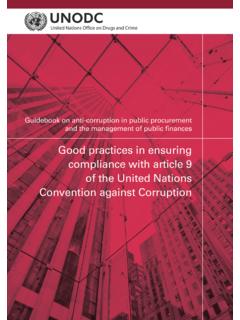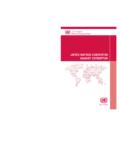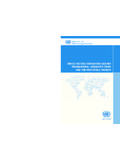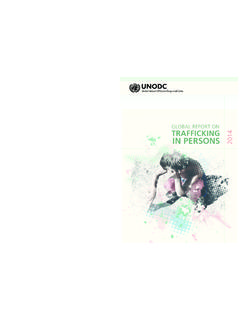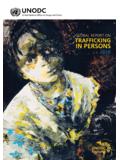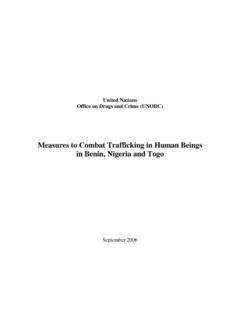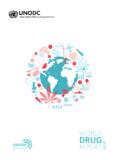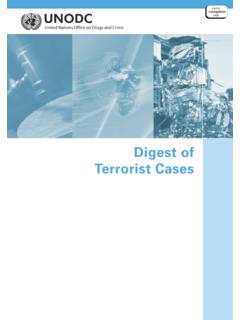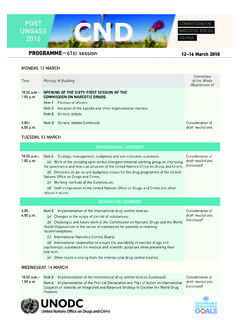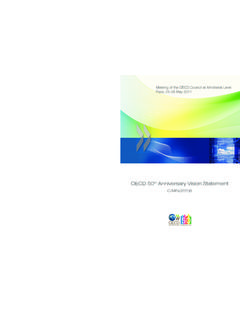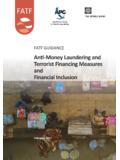Transcription of Doha Declaration on Integrating Crime Prevention and ...
1 DOHA Declaration ON Integrating Crime Prevention AND CRIMINAL JUSTICE INTO THE WIDER UNITED NATIONS AGENDA TO ADDRESS SOCIAL AND ECONOMIC challenges AND TO PROMOTE THE RULE OF LAW AT THE NATIONAL AND INTERNATIONAL LEVELS, AND PUBLIC PARTICIPATION13th UNITED NATIONS CONGRESSON Crime Prevention AND CRIMINAL JUSTICEDoha, 12 19 April 2015 UNITED NATIONS OFFICE ON DRUGS AND CRIMEV iennaThirteenth United Nations Congress on Crime Prevention and Criminal Justice Doha, 12-19 April 2015 Doha Declaration on Integrating Crime Prevention and Criminal Justice into the Wider United Nations Agenda to Address Social and Economic challenges and to Promote the Rule of Law at the National and International Levels, and Public ParticipationUNITED NATIONSNew York, 2015 United Nations, July 2015. All rights reserved, designations employed and the presentation of material in this publication do not imply the expression of any opinion whatsoever on the part of the Secretariat of the United Nations concerning the legal status of any country, territory, city or area, or of its authorities, or concerning the delimitation of its frontiers or production: English, Publishing and Library Section, United Nations Office at ViennaiiiForeword The Doha Declaration was passed by acclamation at the Thirteenth Congress on Crime Prevention and Criminal Justice in Doha, Qatar, in April 2015.
2 The Declaration represents an important achievement as the world comes together to celebrate the seventieth anniversary of the United Nations and define a transformative post-2015 development the Declaration , Member States acknowledged that sustainable development and the rule of law are closely interrelated and mutually reaffirmed the shared commitment to uphold the rule of law and to prevent and counter Crime in all its forms and manifestations , and highlighted the importance of public participation in these efforts. The Declaration also calls on States to make more effective use of globally agreed frameworks such as the United Nations Convention against Transnational Organized Crime and its three Protocols, the United Nations Convention against Corruption, the international drug control conventions, the universal legal instruments against terrorism and United Nations standards and norms on Crime Prevention and criminal justice.
3 This action-oriented Declaration can help to further strengthen collective efforts on Crime Prevention and criminal justice, promote the rule of law and contribute to sus-tainable development. The United Nations Office on Drugs and Crime remains committed to supporting Member States to follow through on the commitments made in Doha, to promote a culture of lawfulness and ensure holistic and comprehensive approaches to counter-ing Crime , violence, corruption and terrorism in all their forms and manifestations .I would also like to take this opportunity to thank the Government of Qatar for the dedication and hospitality that made the Thirteenth Congress a success, and helped support Member States in agreeing this landmark FedotovSecretary-General Executive DirectorThirteenth United Nations Congress United Nations Office on Crime Prevention and Criminal Justice on Drugs and Crime1 Doha Declaration on Integrating Crime Prevention and Criminal Justice into the Wider United Nations Agenda to Address Social and Economic challenges and to Promote the Rule of Law at the National and International Levels, and Public Participation We, Heads of State and Government, Ministers and Representatives of Member States.
4 Having assembled at the Thirteenth United Nations Congress on Crime Prevention and Criminal Justice in Doha, from 12 to 19 April 2015, to reaffirm our shared com-mitment to uphold the rule of law and to prevent and counter Crime in all its forms and manifestations, at the domestic and international levels, to ensure that our criminal justice systems are effective, fair, humane and accountable, to provide access to justice for all, to build effective, accountable, impartial and inclusive institutions at all levels, and to uphold the principle of human dignity and the universal observance and respect of all human rights and fundamental freedoms, To that end, declare the following:1. We acknowledge the 60-year legacy and continuing significant role of the United Nations congresses on Crime Prevention and criminal justice as one of the largest and most diverse international forums for the exchange of views and experiences in research, law and policy and programme development between States, intergovern-mental organizations and individual experts representing various professions and dis-ciplines in order to identify emerging trends and issues in the field of Crime Prevention and criminal justice.
5 We recognize the unique and important contributions of the con-gresses to law and policy development, as well as to the identification of emerging trends and issues in Crime Prevention and criminal justice. 2. We reaffirm the cross-cutting nature of Crime Prevention and criminal justice issues and the consequent need to integrate those issues into the wider agenda of the United Nations in order to enhance system-wide coordination. We look forward to the future contributions of the Commission on Crime Prevention and Criminal Justice with regard to designing and implementing national and international Crime preven-tion and criminal justice policies and programmes, taking into account and building upon the recommendations of the congresses. 3. We recognize the importance of effective, fair, humane and accountable Crime Prevention and criminal justice systems and the institutions comprising them as a 2central component of the rule of law.
6 We commit ourselves to holistic and comprehen-sive approaches to countering Crime , violence, corruption and terrorism in all their forms and manifestations, and to ensuring that those responses are implemented in a coordinated and coherent way, along with broader programmes or measures for social and economic development, poverty eradication, respect for cultural diversity, social peace and social inclusion. 4. We acknowledge that sustainable development and the rule of law are strongly interrelated and mutually reinforcing. We therefore welcome the inclusive and trans-parent intergovernmental process for the post-2015 development agenda, which is aimed at developing global sustainable development goals to be agreed by the General Assembly, and acknowledge the proposals of the Open Working Group of the General Assembly on Sustainable Development Goals as the main basis for Integrating sustain-able development goals into the post-2015 development agenda, while recognizing that other inputs will also be considered.
7 In this context, we reiterate the importance of promoting peaceful, corruption-free and inclusive societies for sustainable develop-ment, with a focus on a people-centred approach that provides access to justice for all and builds effective, accountable and inclusive institutions at all levels. 5. We reaffirm our commitment and strong political will in support of effective, fair, humane and accountable criminal justice systems and the institutions comprising them, and encourage the effective participation and inclusion of all sectors of society, thus creating the conditions needed to advance the wider United Nations agenda, while respecting fully the principles of sovereignty and territorial integrity of States and recognizing the responsibility of Member States to uphold human dignity, all human rights and fundamental freedoms for all, in particular for those affected by Crime and those who may be in contact with the criminal justice system, including vulnerable members of society, regardless of their status.
8 Who may be subject to multiple and aggravated forms of discrimination, and to prevent and counter Crime motivated by intolerance or discrimination of any kind. To that end, we endeavour: (a) To adopt comprehensive and inclusive national Crime Prevention and criminal justice policies and programmes that fully take into account evidence and other relevant factors, including the root causes of Crime , as well as the conditions conducive to its occurrence, and, in accordance with our obligations under interna-tional law and taking into consideration relevant United Nations standards and norms in Crime Prevention and criminal justice, to ensure appropriate training of officials entrusted with upholding the rule of law and the protection of human rights and fun-damental freedoms; (b) To ensure the right of everyone to a fair trial without undue delay by a com-petent, independent and impartial tribunal established by law, to equal access to justice with due process safeguards and, if needed, to access to an attorney and to an inter-preter, and to ensure relevant rights under the Vienna Convention on Consular 3 Relations;1 to exercise due diligence to prevent and counter acts of violence; and to take effective legislative, administrative and judicial measures to prevent, prosecute and punish all forms of torture and other cruel, inhuman or degrading treatment or punishment and eliminate impunity.
9 (c) To review and reform legal aid policies for expansion of access to effective legal aid in criminal proceedings for those without sufficient means or when the inter-ests of justice so require, including, when necessary, through the development of national plans in this field, and to build capacities to provide and ensure access to effective legal aid in all matters and in all its forms, taking into account the United Nations Principles and Guidelines on Access to Legal Aid in Criminal Justice Systems;2 (d) To make every effort to prevent and counter corruption, and to implement measures aimed at enhancing transparency in public administration and promoting the integrity and accountability of our criminal justice systems, in accordance with the United Nations Convention against Corruption.
10 3 (e) To integrate child- and youth-related issues into our criminal justice reform efforts, recognizing the importance of protecting children from all forms of violence, exploitation and abuse, consistent with the obligations of parties under relevant inter-national instruments, including the Convention on the Rights of the Child4 and its two Optional Protocols,5 and taking into consideration the relevant provisions of the United Nations Model Strategies and Practical Measures on the Elimination of Violence against Children in the Field of Crime Prevention and Criminal Justice,6 as well as to develop and apply comprehensive child-sensitive justice policies focused on the best interests of the child, consistent with the principle that the deprivation of liberty of children should be used only as a measure of last resort and for the shortest appropriate period of time, so as to protect children who are in contact with the criminal justice system, as well as children who are in any other situation requiring legal proceedings, particularly in relation to their treatment and social reintegration.
